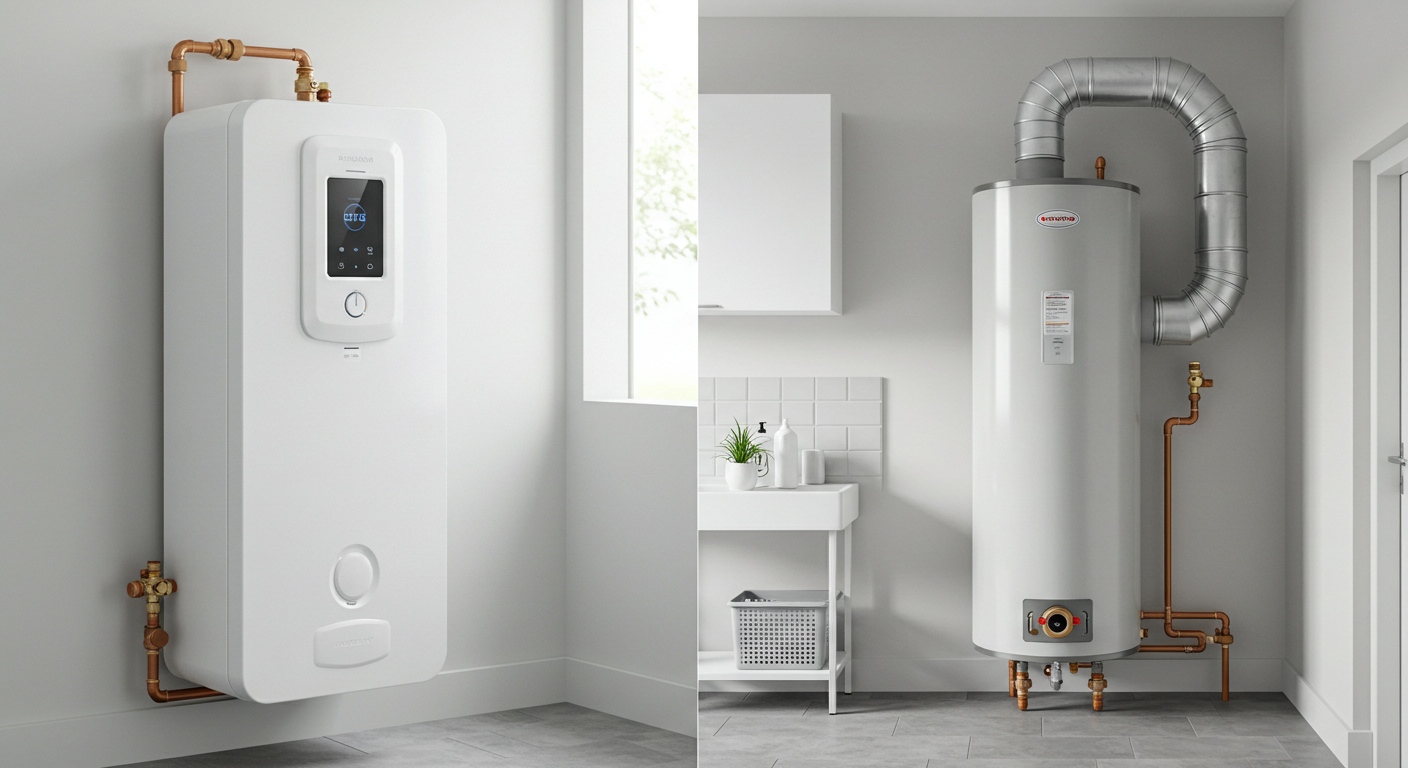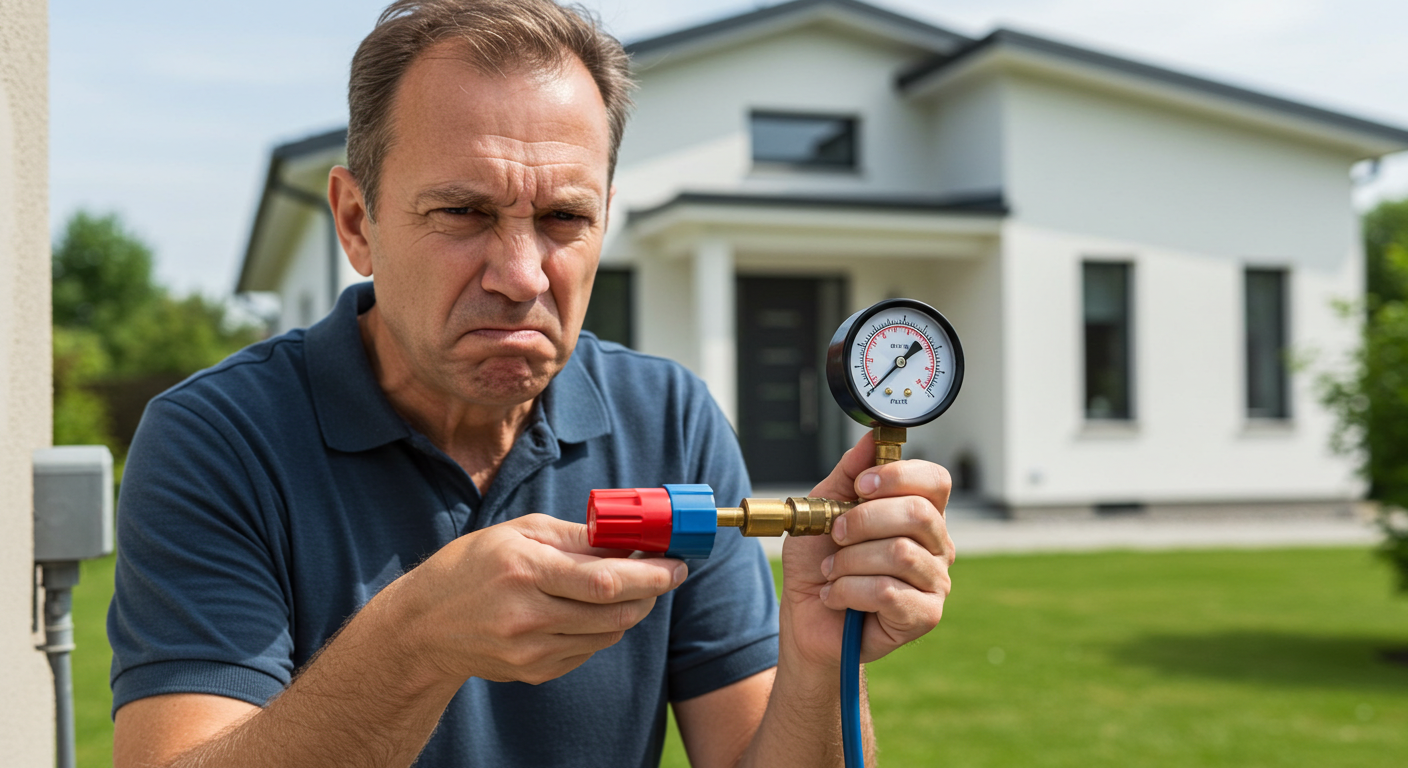Electric vs Gas Tankless Water Heater: Which Should You Install?

Tankless water heaters offer an efficient, space-saving solution for homes across North Texas—but when it comes to choosing between electric vs gas tankless water heaters, homeowners are often left wondering which one is right for their needs. Each system has its own set of pros and cons that can significantly impact your home’s comfort, energy bills, and long-term maintenance needs.
In this guide, we’ll break down everything you need to know about tankless water heater types so you can make the smartest decision for your household.
What Is a Tankless Water Heater?
Unlike traditional water heaters that store and continuously heat a large tank of water, tankless systems heat water only as it’s needed. This “on-demand” functionality improves energy efficiency and ensures you never run out of hot water during a shower or dishwashing cycle.
Tankless units come in two main types:
- Electric tankless water heaters
- Gas (natural gas or propane) tankless water heaters
Let’s explore the key differences so you can decide which tankless water heater is right for your home.
Pros and Cons of Electric Tankless Water Heaters
Electric tankless water heaters are often praised for their affordability, simplicity, and compact design. Here’s what to expect:
Advantages:
- Lower upfront cost: Most whole-home electric units range from $500–$700, making them significantly more affordable than gas models.
- Easier installation: No venting required means installation is less invasive and more location-flexible—perfect for smaller homes or tight utility closets.
- Minimal maintenance: Electric models typically require little to no maintenance beyond periodic flushing and filter cleaning.
- Environmentally friendly: Electric units produce zero emissions and are compatible with renewable energy sources like solar.
Disadvantages:
- Electrical capacity required: These systems demand a high power load (often requiring 200-amp service). Older homes may need expensive panel upgrades.
- Limited flow rate: In colder climates or high-demand households, electric systems may struggle to provide hot water to multiple fixtures simultaneously.
If you’re living in a warmer region like North Texas, where incoming water temperatures aren’t drastically cold, and your household hot water needs are moderate, an electric unit might be the ideal fit.
Pros and Cons of Gas Tankless Water Heaters
Gas tankless heaters remain a popular option for homeowners who prioritize performance—especially in larger homes or households with heavy hot water use.
Advantages:
- Higher flow capacity: Gas units can handle higher gallons per minute (GPM), making them suitable for homes with multiple simultaneous water demands.
- Lower operating costs (for now): Natural gas remains cheaper than electricity in many areas, potentially reducing monthly utility bills.
- Faster heating: Gas systems respond quickly to demand, providing near-instant hot water without noticeable lag.
Disadvantages:
- Higher installation cost: Requires professional venting, combustion air access, and often a larger gas line—raising installation costs by $1,000 or more.
- Ongoing maintenance: Gas systems need annual inspections to prevent combustion issues and maintain safety.
- Environmental impact: Burning natural gas produces greenhouse gases, contributing to carbon emissions.
For homeowners with high water demands and existing gas infrastructure, gas tankless heaters may be worth the investment—but only if the long-term costs and maintenance make sense for your situation.
Key Factors to Consider Before Choosing
Choosing the right type of tankless water heater isn’t just about the unit itself—it’s about your home, your habits, and your budget. Here’s what to think through:
1. Your Household’s Hot Water Demand
Estimate how many gallons per minute your home typically uses.
- One shower = ~2.5 GPM
- Dishwasher = ~1.5 GPM
- Laundry = ~1.5 GPM
Add these up if appliances run at the same time. If your total exceeds 5 GPM regularly, a gas heater might serve you better.
2. Local Energy Costs
In North Texas, natural gas tends to be cheaper per BTU than electricity—but this could shift. According to the U.S. Energy Information Administration, gas prices fluctuate more than electricity and are projected to rise faster in the long term.
3. Installation Location
- No venting? Go electric.
- Have an outdoor wall and gas hookup? A gas heater might be a good fit.
Electric systems can be placed virtually anywhere, including closets or under sinks.
4. Environmental Concerns
Electric tankless heaters are the cleaner option, especially in homes powered by solar or wind energy. They generate no greenhouse gases and have a smaller environmental footprint over time.
5. Maintenance Expectations
Gas tankless heaters require more routine servicing. If you're looking for low-hassle ownership, electric units win here.
Final Verdict: Which Tankless Water Heater Is Best?
If you’re looking for:
- Lower upfront cost
- Minimal maintenance
- Environmentally conscious choice
Go with an electric tankless water heater.
If you need:
- High-volume hot water for multiple fixtures
- Faster recovery during peak usage
- Lower operational cost in gas-heavy areas
A gas tankless water heater may be better—especially if your home already runs on natural gas.
Still unsure? The best decision comes from evaluating your unique home layout, energy access, and lifestyle. That’s where we can help.
Talk to a Local Expert Before You Decide
Choosing the right water heater is a long-term decision that affects comfort, utility costs, and resale value. At Top Flow Plumbing, we’ve helped hundreds of North Texas homeowners upgrade to the perfect system for their needs—whether that’s electric, gas, or a custom hybrid approach.
Contact us today or get started here to schedule a professional consultation and installation quote.
Need more information first? Explore our residential plumbing services or read our guide on signs it’s time to replace your water heater
Keep Exploring Plumbing Insights
Looking for more expert tips and solutions? Check out our other articles for helpful advice, maintenance guides, and smart ways to protect your home’s plumbing system.
You Can Trust Us With Your Family's Plumbing Needs
Contact Top Flow Plumbing Co. today for reliable solutions tailored to your home’s plumbing needs so you don't have to worry about your home being ruined by plumbing issues.




